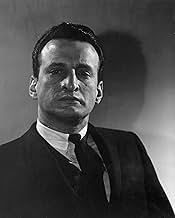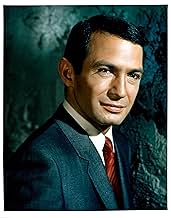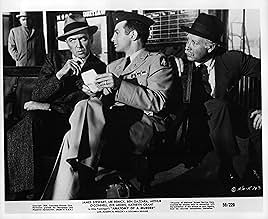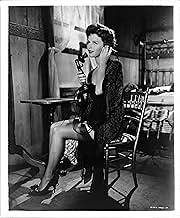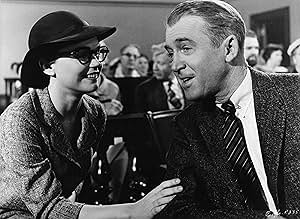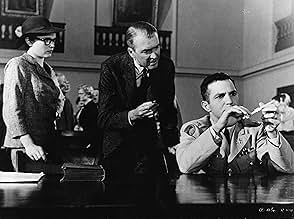अपनी भाषा में प्लॉट जोड़ेंAn upstate Michigan lawyer defends a soldier who claims he killed an innkeeper due to temporary insanity after the victim raped his wife. What is the truth and will he win his case?An upstate Michigan lawyer defends a soldier who claims he killed an innkeeper due to temporary insanity after the victim raped his wife. What is the truth and will he win his case?An upstate Michigan lawyer defends a soldier who claims he killed an innkeeper due to temporary insanity after the victim raped his wife. What is the truth and will he win his case?
- 7 ऑस्कर के लिए नामांकित
- 10 जीत और कुल 18 नामांकन
फ़ीचर्ड समीक्षाएं
Well filmed, beautifully acted, and painstakingly directed, this film deserves the highest praise.
James Stewart brings his customary stammering, quirky charm to a role that could have easily become overwhelmingly serious. Lee Remick is seen establishing her early image as the somehow fragile, undeniably seductive pawn (see also "A Face in The Crowd"), while Gazzara wavers intensely somewhere between heartless murderer and protective husband. The supporting cast is strong, creating a human backdrop for the senior players, keeping the story in the real world, effectively preventing this from becoming an exercise in legal theory.
This film is noteworthy for a myriad of reasons, but most specifically because it addresses the still controversial issue of acquaintance rape, and presents us with a victim of questionable morals. At the same time our murder victim is seen as a monster, then a friend and father. There really are no heroes here, no noble defenders, no pristine heroines, no completely innocent bystanders...both sides take their turns pointing fingers, each claiming that the other only got what they deserved.
We are forced to re-evaluate our thoughts on what constitutes justifiable homicide--the unwritten law that Manion speaks of in the film versus the law as written that Biegler must now interpret. This manipulation of intended meaning sets a somewhat tragic precedent evident in the legal system we work within today.
This film is highly entertaining, and excellent for discussion. Watch it with some of your more philosophical friends.
James Stewart brings his customary stammering, quirky charm to a role that could have easily become overwhelmingly serious. Lee Remick is seen establishing her early image as the somehow fragile, undeniably seductive pawn (see also "A Face in The Crowd"), while Gazzara wavers intensely somewhere between heartless murderer and protective husband. The supporting cast is strong, creating a human backdrop for the senior players, keeping the story in the real world, effectively preventing this from becoming an exercise in legal theory.
This film is noteworthy for a myriad of reasons, but most specifically because it addresses the still controversial issue of acquaintance rape, and presents us with a victim of questionable morals. At the same time our murder victim is seen as a monster, then a friend and father. There really are no heroes here, no noble defenders, no pristine heroines, no completely innocent bystanders...both sides take their turns pointing fingers, each claiming that the other only got what they deserved.
We are forced to re-evaluate our thoughts on what constitutes justifiable homicide--the unwritten law that Manion speaks of in the film versus the law as written that Biegler must now interpret. This manipulation of intended meaning sets a somewhat tragic precedent evident in the legal system we work within today.
This film is highly entertaining, and excellent for discussion. Watch it with some of your more philosophical friends.
The legendary James Stewart has worked for several of Hollywood's most legendary directors including Frank Capra and Alfred Hitchcock but his films for them can not reach the level of this 1959 Columbia Pictures release that he did for Otto Preminger. Stewart gives his all time greatest performance in a gem of a courtroom drama that is often overlooked. Released on the heels of several other courtroom drama classics such as "Twelve Angry Men" and "Witness For The Prosecution", "Anatomy Of A Murder" tells the story of a small town Michigan lawyer (Stewart) who takes on the case of an army officer who is standing trial for murdering a man who he believes had raped his wife. A little risque and controversial for its time but still a classic and time has served it well. A triumph for all of the talent involved.
... since part of the allure is the mystery as to whether or not a true murder has been committed in the first place. There is a killing - but is it murder? That is what this courtroom drama is trying to determine.
Paul Biegler (James Stewart) is a country lawyer in Michigan who was once the local DA but must have lost reelection at some point. He seems to consider himself pseudo-retired, as he stays in just enough contract work to finance his true love - fishing. But then a lieutenant in the army (Ben Gazzara as Fred Manion) kills the man who raped his wife (Lee Remick as Laura Manion), is charged with murder, and Biegler has a big case on his hands.
Manion is a bit shifty - At first claiming he has the "unwritten law" on his side. But then when Biegler tells him there really is no such thing, Manion adjusts his story such that temporary insanity could be a plausible defense.
The truth is, it never is clear which was true - Did Manion truly temporarily lose it when he saw his wife brutalized by a rapist, or did Laura Manion get cold busted by her husband stepping out with another man with the result being that Lt. Manion lost his temper and killed the other man? Gazzara plays his part as arrogant and Remick plays her part as flirty, each shooting the other looks at various points that indicate they are keeping at least part of the truth to themselves. What keeps it interesting are the characters, the emphasis on the legal process, and the question I just posed that hangs over the entire proceedings. Although everyone is good, the judge is an absolute understated scream. You can tell he doesn't like having this high profile case in his courtroom, that like Biegler he'd rather be fishing, but he has a job to do and he'll do it fairly. Joseph Welch played the part of the judge, and the fact that he was actually an attorney gives the performance the needed authenticity.
James Stewart was supposed to star in "North By Northwest" in 1959, but Hitchcock was angry at him because Vertigo had been a commercial failure, calling Stewart too old. He then dumped Stewart for Cary Grant so that Stewart was available to do this film. In the end, everything worked out. All three films are now recognized classics, and I can't see anybody but Stewart with his folksy charm playing the lead in this film.
Paul Biegler (James Stewart) is a country lawyer in Michigan who was once the local DA but must have lost reelection at some point. He seems to consider himself pseudo-retired, as he stays in just enough contract work to finance his true love - fishing. But then a lieutenant in the army (Ben Gazzara as Fred Manion) kills the man who raped his wife (Lee Remick as Laura Manion), is charged with murder, and Biegler has a big case on his hands.
Manion is a bit shifty - At first claiming he has the "unwritten law" on his side. But then when Biegler tells him there really is no such thing, Manion adjusts his story such that temporary insanity could be a plausible defense.
The truth is, it never is clear which was true - Did Manion truly temporarily lose it when he saw his wife brutalized by a rapist, or did Laura Manion get cold busted by her husband stepping out with another man with the result being that Lt. Manion lost his temper and killed the other man? Gazzara plays his part as arrogant and Remick plays her part as flirty, each shooting the other looks at various points that indicate they are keeping at least part of the truth to themselves. What keeps it interesting are the characters, the emphasis on the legal process, and the question I just posed that hangs over the entire proceedings. Although everyone is good, the judge is an absolute understated scream. You can tell he doesn't like having this high profile case in his courtroom, that like Biegler he'd rather be fishing, but he has a job to do and he'll do it fairly. Joseph Welch played the part of the judge, and the fact that he was actually an attorney gives the performance the needed authenticity.
James Stewart was supposed to star in "North By Northwest" in 1959, but Hitchcock was angry at him because Vertigo had been a commercial failure, calling Stewart too old. He then dumped Stewart for Cary Grant so that Stewart was available to do this film. In the end, everything worked out. All three films are now recognized classics, and I can't see anybody but Stewart with his folksy charm playing the lead in this film.
I have tried more cases than I can remember - hundreds. This movie, more than any other, comes closet to real life.
In criminal cases., the first and most important thing is - the phone call. That's right, getting the case.
Next comes the 'talk.' An attorney has to inform the client of the possible outcomes given the facts. In Anatomy of a Murder, the main facts are 'undisputed', that is, there is no doubt that the defendant killed the victim.
Given that fact, there are only so many possible defenses - and so Jimmy Stewart, in one of the best performances of his career, relates those defenses to Ben Gazzara, in one of his best performances.
Along the way, we are treated to George C. Scott's premiere performance on screen - and it is is magnificent.
Did I mention how incredible and sexy and vulnerable Lee Remick is?
And the rest of the cast is also as good as it gets.
And then there's the Duke Ellington score (he won a Grammy) and the Wendell Mayes screenplay and the B/W cinematography by Sam Leavitt (The Defiant Ones (Oscar-winner), A Star is Born (1954)).
Watch this movie to see how to make a crime drama. There is nothing as good as it is - nothing.
Based on the famous Traver novel, ANATOMY OF A MURDER is an extremely complex film that defeats easy definition. In some respects it is a social document of the era in which it was made; primarily, however, it is a detailed portrait of the law at work and the mechanizations and motivations of the individuals involved in a seemingly straight-forward case. In the process it raises certain ethical issues re attorney behavior and the lengths to which an attorney might go to win a case.
Paul Biegler (James Stewart) is a small-town lawyer who has recently lost a re-election for the position of District Attorney and who is down on his luck--when a headline-making case involving assault, alleged rape, and murder drops into his lap. As the case evolves, there is no question about the identity of the killer. But a smart lawyer might be able to get him off just the same and redeem his own career in the process, and with the aid of an old friend (Arthur O'Connell) and his formidable secretary (Eve Arden), Biegler sets out to do precisely that. Opposing him in the courtroom is Claude Dancer (George C. Scott), a high powered prosecutor who is equally determined to get a conviction... and who is no more adverse to coaching a witness than Biegler himself. The two square off in a constantly shifting battle for the jury, a battle that often consists of underhanded tactics on both sides.
The performances are impressive, with James Stewart ideally cast as the attorney for the defense, Ben Gazzara as his unsavory client, and a truly brilliant Lee Remick as the sexy and disreputable wife who screams rape where just possibly none occurred; O'Connell, Arden, and Scott also offer superior performances. The script is sharp, cool, and meticulous, the direction and cinematography both effective and completely unobtrusive, and the famous jazz score adds quite a bit to the film as a whole.
Although we can't help rooting for Stewart, as the film progresses it seems more and more likely that Remick is lying through her teeth and Gazzara is as guilty as sin--but the film balances its elements in such a way as to achieve a disturbing ambiguity that continues right through to the end. If you expect a courtroom thriller with sudden revelations and twists you'll likely be disappointed in ANATOMY OF A MURDER, but if you want a thought-provoking take on the law you'd be hard pressed to find one better. Recommended.
Gary F. Taylor, aka GFT, Amazon Reviewer
Paul Biegler (James Stewart) is a small-town lawyer who has recently lost a re-election for the position of District Attorney and who is down on his luck--when a headline-making case involving assault, alleged rape, and murder drops into his lap. As the case evolves, there is no question about the identity of the killer. But a smart lawyer might be able to get him off just the same and redeem his own career in the process, and with the aid of an old friend (Arthur O'Connell) and his formidable secretary (Eve Arden), Biegler sets out to do precisely that. Opposing him in the courtroom is Claude Dancer (George C. Scott), a high powered prosecutor who is equally determined to get a conviction... and who is no more adverse to coaching a witness than Biegler himself. The two square off in a constantly shifting battle for the jury, a battle that often consists of underhanded tactics on both sides.
The performances are impressive, with James Stewart ideally cast as the attorney for the defense, Ben Gazzara as his unsavory client, and a truly brilliant Lee Remick as the sexy and disreputable wife who screams rape where just possibly none occurred; O'Connell, Arden, and Scott also offer superior performances. The script is sharp, cool, and meticulous, the direction and cinematography both effective and completely unobtrusive, and the famous jazz score adds quite a bit to the film as a whole.
Although we can't help rooting for Stewart, as the film progresses it seems more and more likely that Remick is lying through her teeth and Gazzara is as guilty as sin--but the film balances its elements in such a way as to achieve a disturbing ambiguity that continues right through to the end. If you expect a courtroom thriller with sudden revelations and twists you'll likely be disappointed in ANATOMY OF A MURDER, but if you want a thought-provoking take on the law you'd be hard pressed to find one better. Recommended.
Gary F. Taylor, aka GFT, Amazon Reviewer
क्या आपको पता है
- ट्रिवियाPart of the controversy surrounding this movie was because it included use of the words "bitch", "contraceptive", "panties", "penetration", "rape", "slut", and "sperm".
- गूफ़James Stewart goes to negotiate with the DA at the courthouse. Sign over the DA's door is misspelled "Proseguting attorney". Actually this is not true. It's possible to compare the c with the g at the end of the word, and you can see the g has a descending stroke. It's just a foible of the font.
- भाव
Paul Biegler: As a lawyer, I've had to learn that people aren't just good or just bad. People are many things.
- कनेक्शनFeatured in Portrait of an Actor (1971)
टॉप पसंद
रेटिंग देने के लिए साइन-इन करें और वैयक्तिकृत सुझावों के लिए वॉचलिस्ट करें
विवरण
- रिलीज़ की तारीख़
- कंट्री ऑफ़ ओरिजिन
- भाषा
- इस रूप में भी जाना जाता है
- Anatomía de un asesinato
- फ़िल्माने की जगहें
- Tripoli Bar, Ishpeming, मिशिगन, संयुक्त राज्य अमेरिका(interiors: Thunder Bay Inn)
- उत्पादन कंपनी
- IMDbPro पर और कंपनी क्रेडिट देखें
बॉक्स ऑफ़िस
- दुनिया भर में सकल
- $194
- चलने की अवधि2 घंटे 41 मिनट
- रंग
- ध्वनि मिश्रण
- पक्ष अनुपात
- 1.85 : 1
इस पेज में योगदान दें
किसी बदलाव का सुझाव दें या अनुपलब्ध कॉन्टेंट जोड़ें




